Text
#WomenBelongInSTEM
by Brandon Yu
I am a senior at Rutgers University studying Computer Science and minoring in Digital Communication, Information, & Media.
An Industry Dominated by Men
STEM fields (science, technology, engineering, and medicine) fields have historically consisted a majority of male workers. According to the European Data Journalism Network, only 16.7% of ICT (information & communications technology) specialists were women. Yet women are clearly capable of working in STEM roles, some prominent examples like Marie Curie and Grace Hopper, and not to mention the many capable women who currently work in STEM. So why is there such a large gender gap? According to a report from the AAUW, one major cause is stereotyping and biases. When a woman is studying in and even working in a STEM field, they often experience cognitive and emotional burden related to stereotypes regarding women in such fields, such as women not being as good at math and engineering than men. These burdens either exist in the minds of women because of the society they have grown up in or can be seen by people, men, in the industry who believe such stereotypes and biases who then reflect their views through certain action. It can go as far as sexual harassment which was found to be pervasive in US physics programs according to Nature.com
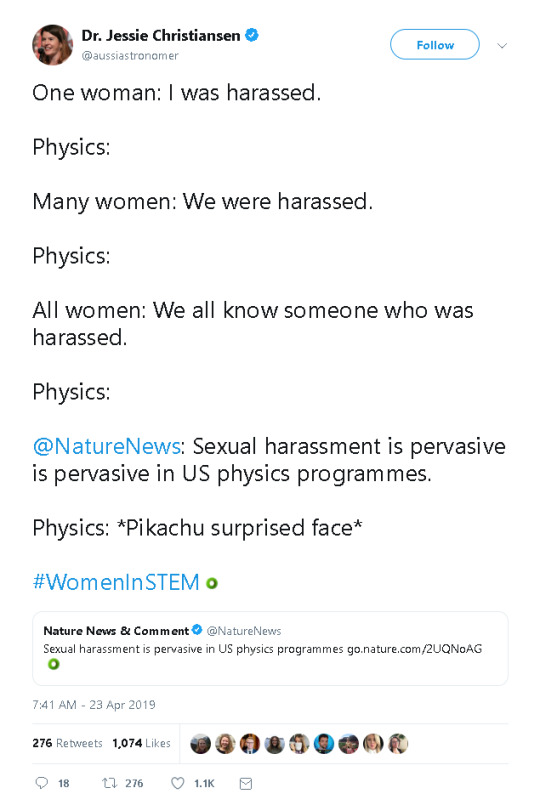
https://twitter.com/aussiastronomer/status/1120699266589024256
Without the support of other women, it’s hard for women to mentally stick to their STEM fields when faced with societal backlash. However, by using social media, women can receive and give the support they need through hashtag movements like #WomenInTech, where the issues that surround women in tech industries are legitimized and worked on in order to improve societal views for the future.
A Network of Supportive Women Behind a Hashtag
Throughout various social media platforms, there is a type of affordance on these sites that allow people to tag their posts, which then categorizes it and makes it searchable. This makes it easier for marginalized groups, such as women in STEM, to create a networked counterpublic where they are able to support each other and share their issues. #WomenInSTEM, #WomenInTech, and #GirlsWhoCode are just a few examples of tags that women use to share that they exist in these industries. It’s important to understand how and why women use these hashtags. Women in tech are a marginalized group and this means they face backlash from certain people purely just because they are in the tech industry. This could be due to many factors, but to put it simply, society has historically seen men in these technology and science roles, so stereotypes and biases have developed around women in the industry. Therefore, women often face ridicule and criticism for being in or even trying to be in the industry. This causes emotional stress for women to the point that some feel unmotivated to continue with their careers. According to Forbes, women actually leave the tech industry at a rate 45% higher than men. However, with the use of #WomenInTech, and other related hashtags, women in tech around the world can share that they exist and face similar problems. By legitimizing and recognizing the issues, women can band together behind these hashtags and support each other by showing that despite certain backlash, women can thrive in the tech industry. It’s a way to show other women in tech that they aren’t alone and that they can have the ability and right to exist in their industries.
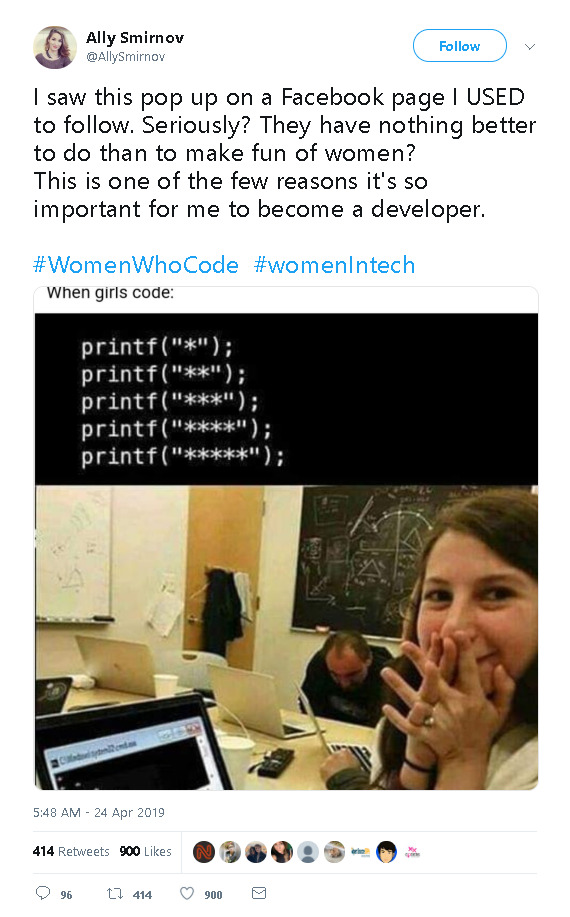
https://twitter.com/AllySmirnov/status/1121033196332888066
Uses of the Hashtags
The #WomenInSTEM, #WomenInTech, and #GirlsWhoCode hashtags are used in a variety of ways. Sometimes they’re used to show off the work done by women in tech or encouraging other women to be in the tech field, and other times they are used to make light on the issues that women in tech face, usually paired with a call to action on how things can change.

https://www.instagram.com/p/BsOucg8BNQD/
In this Instagram post above, a woman is encouraging other women that learning to code isn’t actually as difficult as society makes it out to be. It’s important for women to tell other women this because for many women, they have possibly grown up being told that math is for boys or girls aren’t good at math (or replace the word “math” with “coding” or “engineering”), so to have a woman tell another woman that they can do it can be impactful for a woman’s motivation.
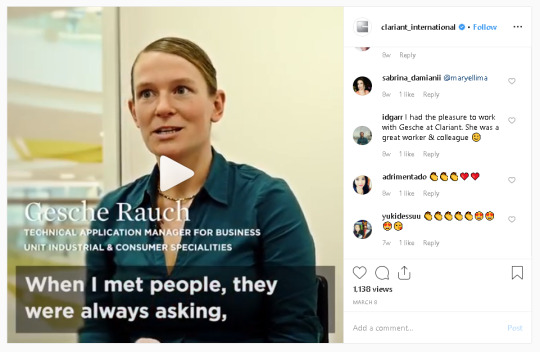
https://www.instagram.com/p/BuwHDBbH105/
The video above shows the societal issues that women in STEM face as well as hope for the future. The woman in the video, Gesche Rauch, begins by talking about experiences she’s had with people who act surprised that she is working full time in a science position, yet they don’t say anything to her boyfriend who is in a similar position. This scenario is one that women around the world face because society still believes that women are good enough for these roles. Rauch has a daughter herself and tries her best to show her that STEM can be interesting and for girls and women.
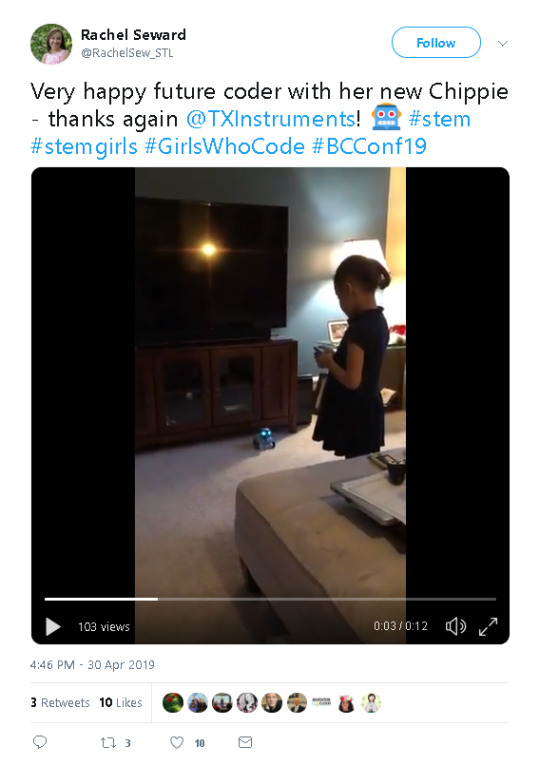
https://twitter.com/RachelSew_STL/status/1123373112307998721
This tweet shows a little girl operating a robot, with the assumption that it is programmable. It’s important to show society and young women that even at a young age, women and girls can do what society tells them isn’t for them. Many girls grow up believing that STEM positions are not for girls, so posts like the one above are an important step to changing what society views as acceptable - the idea that women DO belong in STEM.
Real World Impact
While social media is a place online for women to support each other, change in the real world is as or even more important. One way women are able to support and encourage each other offline are through events. Many of these events mainly market themselves to women, in some cases making them exclusive to women, in order to foster an environment that is welcoming to women. Some events like Technica, are a weekend-long hackathon, where female and non-binary participants can team up to learn and program. These events open the door for more women to, even as simply, try out computer programming because it offers a stereotype and bias free environment to those who may be interested in learning but are afraid or not confident for whatever reason.
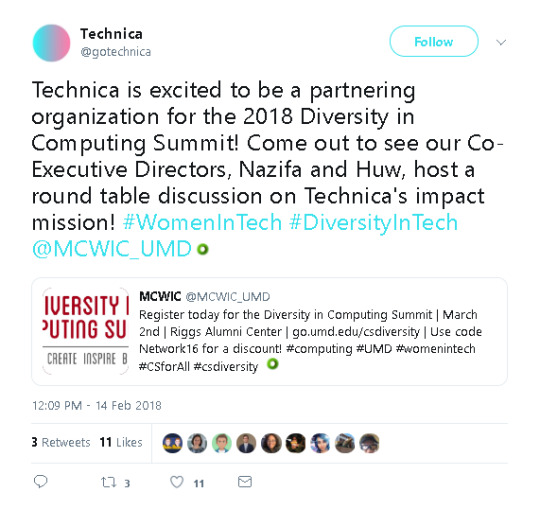
https://twitter.com/gotechnica/status/963867811952119809
Other events like the Grace Hopper Conference, exist to celebrate women in their industries. Events like these help empower women and organizations around the world by bringing them together and holding encouraging events and panels. Organizations like Girls Who Code help girls and women enter an industry that primarily consists of men by giving girls the resources, education, and knowledge to succeed in the tech industry through various educational programs. While STEM fields are still not equal, in regards to gender, these online hashtag movements make great strides in changing what societal stereotypes and biases of women in tech. It not only gives women a supportive community online, but also leads to real life change and support because as more people use #WomenInTech or #WomenInSTEM, it shows, ever more clearly, that #WomenBelongInSTEM.
Sources:
https://www.europeandatajournalism.eu/eng/News/Data-news/The-ICT-sector-is-booming.-But-are-women-missing-out
https://www.nature.com/articles/d41586-019-01303-6?utm_source=twt_nnc&utm_medium=social&utm_campaign=naturenews&sf211430626=1
https://interestingengineering.com/10-greatest-women-stem
https://ghc.anitab.org/about-grace-hopper/
https://www.aauw.org/research/why-so-few/
https://girlswhocode.com/
https://www.forbes.com/sites/quora/2017/02/28/why-women-leave-the-tech-industry-at-a-45-higher-rate-than-men/#7149ece4216a
https://gotechnica.org/
https://ghc.anitab.org/
https://twitter.com/aussiastronomer/status/1120699266589024256
https://twitter.com/AllySmirnov/status/1121033196332888066
https://www.instagram.com/p/BsOucg8BNQD/?utm_source=ig_share_sheet&igshid=c3bq4g2dk6y9
https://www.instagram.com/p/BuwHDBbH105/?utm_source=ig_share_sheet&igshid=1ecmnx1vg0nn5
https://twitter.com/RachelSew_STL/status/1123373112307998721
https://twitter.com/gotechnica/status/963867811952119809
0 notes
Text
#Women In Tech
Hi there! My name is Brandon Yu and I’m a senior at Rutgers University. I’m studying Computer Science, but also minoring in Digital Communication, Information, & Media (DCIM). For one of my DCIM classes, I plan to study the #WomenInTech hashtag, which may also include related tags such as #GirlsWhoCode or #WomenInSTEM. I chose this hashtag because as a Computer Science student and a member of the tech industry, I work with many women that feel intimidated by the culture. Since STEM is generally a male-dominant field, there are certain practices that make women feel unwelcome in the industry and it needs to change. The hashtag #womenintech, in response, is to show that women do exist in the industry and can succeed despite the constant hardships and challenges that they may face in the industry. It’s one of the many ways that social media is being used to help make tech and STEM more inclusive. Through this project, I’d like to further learn about what type of hardships women face in tech and what we can do to fix it.
1 note
·
View note